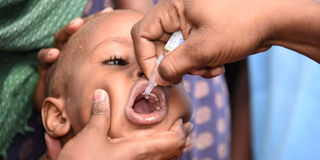Efforts to regain polio-free status pay off for Kenya

A boy receives the oral polio vaccine. Kenya has regained its polio free status. PHOTO | FILE | NATION MEDIA GROUP
The aggressive campaigns to eliminate polio may have borne fruit after the World Health Organisation (WHO) announced that Kenya, alongside three other African countries, had regained their polio-free status.
According to a statement posted on WHO’s website, Kenya, Mozambique and Niger curbed polio outbreaks and were only affected by 14 cases that arose from children being given the vaccine in 2018 and early 2019.
Dr Modjirom Ndoutabe, coordinator of WHO-led polio outbreaks Rapid Response Team for the African Region, said: “Ending outbreaks in the three countries is proof that response activities along with high quality immunisation campaigns and vigilant disease surveillance can stop the remaining outbreaks in the region.”
Kenya had intensified its immunisation campaigns. In November 2019, the Health ministry said it would vaccinate 2.6 million children under the age of five against polio.
Health ministry’s Head of Department of Disease Surveillance and Response Daniel Lang’at said the National Launch of the Polio Vaccination drive ran from November 29 to December 4, 2019 in Isiolo County.
The country’s battle against polio has surmounted several challenges such as health workers strikes, which interrupted services. The vaccinations have also been disrupted by anti-vaccination campaigns especially from religious circles.
Kenya is also surrounded by unstable countries that make it vulnerable to infectious diseases such as Somalia and Sudan.
The country also improved its surveillance. A system called Acute Flaccid Paralysis is used to detect and report cases of paralysis in children under 15 years in all countries.
Dr Lang’at did not divulge details on how the war against polio was achieved as he was not authorised to talk to journalists, but only said: “The ministry worked very hard with the partners to make this happen.”
POOR SANITATION
The Global Polio Eradication Initiative, which coordinates polio immunisation campaigns, had stated in 2019 that Kenya is classified by the International Health Regulations as a state vulnerable to reinfection and has the potential risk of international spread. This status was to be reviewed in December 2019 and its seems the country has pulled through.
There has not been any wild poliovirus in Africa since 2016. In 1996 wild poliovirus paralysed more than 75,000 children across the continent.
Polio is a horrific disease spread by the Poliomyelitis virus. The human — the only known host of the virus — sheds it to the environment through excreta. Poor sanitation enables the virus to spread. Once in the body, it attacks the brain and spinal cord, bending children’s limbs into spider-like irreversible contortions just hours after infection.
Apart from ensuring hygiene, the disease is prevented by vaccination.
Polio infections arising from vaccines are extremely rare, but under the right conditions — such as populations that do not get full vaccination coverage and live in areas with poor sanitation such as refugees — it can occur.
According to WHO, this is how that happens: vaccines are weakened forms of the diseases the child is being vaccinated against, so that the body can learn how to fight it by building up the needed immunity. When children are immunised with the oral polio vaccine, the weakened vaccine virus replicates in their intestines for a short time and is then excreted in faeces into the environment where it can mutate. If polio immunisation coverage is low in a community and sanitation inadequate, the mutated viruses will be transmitted to susceptible populations, leading to emergence of vaccine-derived polioviruses.
Kenya was certified as polio free in 2005, but in March 2018, Kenya Medical Research Institute isolated polio virus type 2, which is vaccine derived, from an environmental sample collected in Eastleigh. WHO then recommended several steps to keep the virus at bay.



